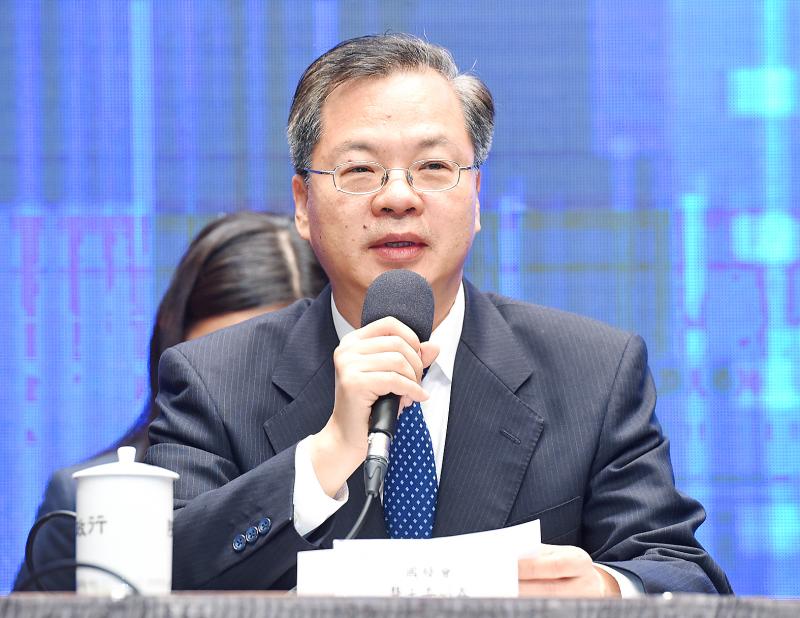The IMF on Tuesday raised its forecast for Taiwan’s GDP growth this year, as the nation is doing better than most other countries in fighting the COVID-19 pandemic.
Taiwan’s GDP growth this year is expected to stand at zero, the IMF said, a significant upgrade from a 4 percent contraction forecast by the fund in April.
With the global economy gradually moving away from the effects of the pandemic, Taiwan’s economy is expected to recover next year and grow 3.2 percent, compared with an earlier estimate of a 3.5 percent increase, the IMF said.

Photo: Liao Chen-huei, Taipei Times
Despite the upgrade, National Development Council (NDC) Minister Kung Ming-hsin (龔明鑫) late on Tuesday said that the IMF has undervalued Taiwan’s economic strength.
“The IMF appears too cautious about Taiwan’s economy,” Kung said.
The Directorate-General of Budget, Accounting and Statistics (DGBAS) in April forecast that the economy would grow 1.56 percent this year and accelerate to 3.92 percent next year.
The economy grew 0.78 percent in the first half of this year and momentum accelerated in the third quarter on the back of an increase in industrial production and exports, as well as improvements in retail sales, and the food and beverage sector, Kung said, citing DGBAS data.
In addition to the nation’s superior efforts in combating the outbreak of COVID-19, the government’s stimulus measures have served as a driver for economic growth, Kung said.
The local electronics sector has benefited from the global booming “stay at home economy,” which has boosted demand for technology devices, much to Taiwan’s advantage, he added.
“Under such favorable circumstances, Taiwan’s GDP growth is expected to top the IMF’s forecast for this year,” Kung said.
“It is unlikely that we will see only zero economic growth,” he added.
“The IMF’s upgrade is not enough for Taiwan and the country’s economy deserves more study by the IMF,” he said.
The global economy is expected to contract by 4.4 percent this year and grow 5.2 percent next year, the IMF said in its latest World Economic Outlook report.

GEOPOLITICAL ISSUES? The economics ministry said that political factors should not affect supply chains linking global satellite firms and Taiwanese manufacturers Elon Musk’s Space Exploration Technologies Corp (SpaceX) asked Taiwanese suppliers to transfer manufacturing out of Taiwan, leading to some relocating portions of their supply chain, according to sources employed by and close to the equipment makers and corporate documents. A source at a company that is one of the numerous subcontractors that provide components for SpaceX’s Starlink satellite Internet products said that SpaceX asked their manufacturers to produce outside of Taiwan because of geopolitical risks, pushing at least one to move production to Vietnam. A second source who collaborates with Taiwanese satellite component makers in the nation said that suppliers were directly

Top Taiwanese officials yesterday moved to ease concern about the potential fallout of Donald Trump’s return to the White House, making a case that the technology restrictions promised by the former US president against China would outweigh the risks to the island. The prospect of Trump’s victory in this week’s election is a worry for Taipei given the Republican nominee in the past cast doubt over the US commitment to defend it from Beijing. But other policies championed by Trump toward China hold some appeal for Taiwan. National Development Council Minister Paul Liu (劉鏡清) described the proposed technology curbs as potentially having

EXPORT CONTROLS: US lawmakers have grown more concerned that the US Department of Commerce might not be aggressively enforcing its chip restrictions The US on Friday said it imposed a US$500,000 penalty on New York-based GlobalFoundries Inc, the world’s third-largest contract chipmaker, for shipping chips without authorization to an affiliate of blacklisted Chinese chipmaker Semiconductor Manufacturing International Corp (SMIC, 中芯). The US Department of Commerce in a statement said GlobalFoundries sent 74 shipments worth US$17.1 million to SJ Semiconductor Corp (盛合晶微半導體), an affiliate of SMIC, without seeking a license. Both SMIC and SJ Semiconductor were added to the department’s trade restriction Entity List in 2020 over SMIC’s alleged ties to the Chinese military-industrial complex. SMIC has denied wrongdoing. Exports to firms on the list

SPECULATION: The central bank cut the loan-to-value ratio for mortgages on second homes by 10 percent and denied grace periods to prevent a real-estate bubble The central bank’s board members in September agreed to tighten lending terms to induce a soft landing in the housing market, although some raised doubts that they would achieve the intended effect, the meeting’s minutes released yesterday showed. The central bank on Sept. 18 introduced harsher loan restrictions for mortgages across Taiwan in the hope of curbing housing speculation and hoarding that could create a bubble and threaten the financial system’s stability. Toward the aim, it cut the loan-to-value ratio by 10 percent for second and subsequent home mortgages and denied grace periods for first mortgages if applicants already owned other residential